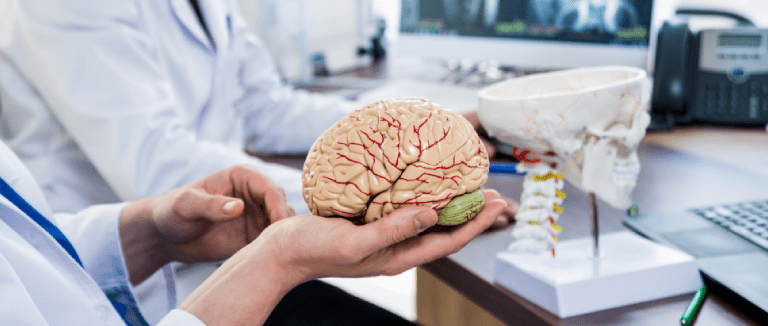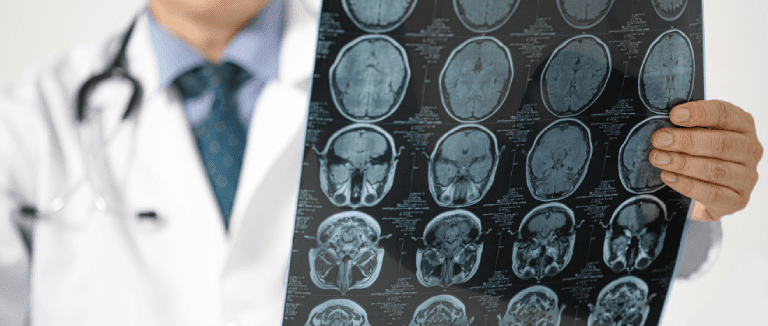
Your brain serves as the command center for your entire body, managing your thoughts, feelings, and actions. However, a brain tumor is an abnormal cluster of cells that develops within the brain, disrupting the delicate balance necessary for smooth functioning. This disturbance can lead to neurological problems and a range of symptoms.
In this blog, you'll learn how to identify both the subtle and more noticeable early warning signs of a brain tumor. We will also provide insights into how brain tumors are diagnosed and what treatment options are available.
What is a Brain Tumor?
A brain tumor is an abnormal mass or cluster of cells that forms within the brain. It's important to understand that not all brain tumors are cancerous (malignant); some are non-cancerous (benign). Benign brain tumors typically do not spread to nearby tissues and tend to grow more slowly, while malignant tumors can invade surrounding areas and may be life-threatening.
Brain tumors can disrupt normal brain function in multiple ways, including by raising the pressure inside the skull (known as intracranial pressure), altering blood flow, or interfering with the normal transmission of electrical signals between neurons. These disruptions can lead to a wide range of symptoms, highlighting the importance of recognizing early warning signs for timely intervention.
Common Brain Tumor Symptoms
Common symptoms of a brain tumor include persistent headaches, changes in vision, seizures, memory problems, cognitive changes, difficulty concentrating, balance and coordination issues, as well as nausea and vomiting.
These symptoms can be caused by a wide range of conditions, so it is important to seek advice from a healthcare professional to obtain an accurate diagnosis if you experience any of them.
- Changes in vision
- Seizures
- Memory problems
- Cognitive changes
- Difficulty concentrating
- Persistent headaches
- Balance and coordination problems
- Nausea and vomiting
- Seizures
- Memory problems
- Cognitive changes
- Difficulties with concentration
- Persistent headaches
- Balance and coordination problems
- Nausea and vomiting
Recognizing the typical symptoms of brain tumors is essential for early detection and effective treatment. For guidance tailored to your situation or to learn more about these symptoms, speak with your healthcare provider.

Rare Or Atypical Symptoms Of Brain Tumor
In some cases, people with brain tumors may develop uncommon or atypical symptoms. The following are some of the less frequent signs that deserve special attention:
- Personality changes
- Memory difficulties
- Hearing loss
- Hormonal imbalances
- Problems with word-finding or speech
- Difficulty understanding language
- Memory problems
- Hearing loss
- Hormonal changes
- Issues with word-finding or articulation
- Difficulties with comprehension
If you or someone you know is experiencing new or unexplained changes in behavior, memory, hearing, or language, it's important to seek a thorough evaluation by a healthcare professional.
Symptoms Of Brain Tumors Based On Their Specific Location
The symptoms of a brain tumor can differ depending on its precise location within the brain. Because each brain region controls specific functions, the symptoms that develop can offer valuable clues about where a tumor may be located. Below is a summary of brain tumor symptoms based on their specific location:
- Frontal Lobe: Increased impulsivity, lack of motivation (apathy), and irritability.
- Parietal Lobe: Numbness, tingling, or altered sensation in the arms or legs.
- Occipital Lobe: Vision problems such as blurry or double vision, loss of visual fields, or visual hallucinations.
- Temporal Lobe: Complex partial seizures, changes in consciousness, unusual sensations, or repetitive movements.
- Parietal Lobe: Numbness, tingling, or altered sensation in the limbs.
- Occipital Lobe: Visual disturbances, such as blurred or double vision, visual field defects, and hallucinations.
- Temporal Lobe: Complex partial seizures, altered consciousness, strange sensations, or repetitive movements.
When Do Brain Tumor Symptoms Show?
One important question about brain tumors is when symptoms are likely to appear. There is no single answer, as the timing of symptom onset can vary widely depending on the type, size, and location of the tumor.
Growth Rate
Certain brain tumors”especially those that are more aggressive”can grow and progress quickly, resulting in symptoms that appear relatively fast. In contrast, slow-growing tumors may be present for a long time before any noticeable symptoms develop.
Location
The location of a brain tumor greatly influences when symptoms appear. Tumors that develop in highly sensitive or densely connected areas of the brain are more likely to cause early symptoms, sometimes even when the tumor is still small.
Size
Smaller tumors often do not cause symptoms until they grow large enough or reach a certain area, at which point increased pressure on the brain may trigger noticeable signs.

Diagnosis Of Brain Tumor In Istanbul
Diagnosing a brain tumor in Istanbul involves a detailed, multi-step approach that includes clinical evaluations and advanced imaging methods. Timely and accurate diagnosis is essential. Below is an overview of the key steps in diagnosing a brain tumor:
Neurological Examination
A neurological examination checks motor skills, sensory responses, coordination, reflexes, and cranial nerve functions. Changes in these areas can help doctors identify and locate a brain tumor.
Magnetic Resonance Imaging (MRI)
MRI is the primary imaging tool for detecting brain tumors, providing detailed images of brain structures and allowing doctors to determine the tumor's location, size, and characteristics. In some cases, a contrast agent is used to enhance the visualization of specific tumors.
Computed Tomography (CT) Scan
CT scans are often used in emergency situations. Using X-rays to create cross-sectional images of the brain, CT scans help assess the tumor's density and detect any areas of calcification.
Biopsy
A biopsy involves removing a small sample of tissue from the tumor for laboratory analysis. This procedure is the most definitive way to determine whether a tumor is benign or malignant.
Schedule an appointment with us in Istanbul for an early and accurate brain tumor diagnosis.
Treatment Of Brain Tumors In Turkey
Treatment for brain tumors in Turkey depends on several factors. The main treatment options include:
Surgery
When possible, surgery is often the first step in treatment. The goal is to remove as much of the tumor as safely as possible while preserving healthy brain tissue.
Radiation Therapy
Radiation therapy uses high-energy X-rays to destroy cancer cells or stop them from growing. It can be administered after surgery to eliminate remaining cancer cells, or as the primary treatment for tumors that cannot be removed surgically.
Chemotherapy
Chemotherapy uses medications to specifically target and destroy cancer cells. These drugs can be given orally or intravenously and are often recommended for tumors that are aggressive or have a high risk of coming back.
Connect with our healthcare team in Turkey to discuss the most effective treatment options for brain tumors and make informed decisions about your care.
Choose Liv Hospital In Turkey For Your Brain Tumor Treatments
Early diagnosis and effective treatment can significantly reduce the impact of brain tumors and improve quality of life. At Liv Hospital, with seven locations across Turkey, our experienced healthcare professionals use advanced medical technology to ensure you receive expert, compassionate care. Throughout your treatment journey, you'll also have the opportunity to enjoy the unique beauty and culture that Turkey has to offer.
For more details about available treatment options and current pricing, please reach out to us directly.
Content by the Liv Hospital Editorial Board. This page is for informational purposes only. Always consult your doctor for diagnosis and treatment. The information here does not constitute medical advice or reflect the full scope of services provided by Liv Hospital.
* Liv Hospital Editorial Board has contributed to the publication of this content .
* Contents of this page is for informational purposes only. Please consult your doctor for diagnosis and treatment. The content of this page does not include information on medicinal health care at Liv Hospital .
For more information about our academic and training initiatives, visit Liv Hospital Academy

